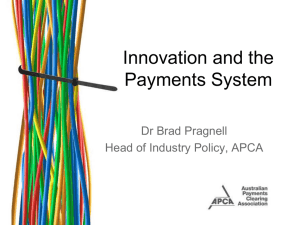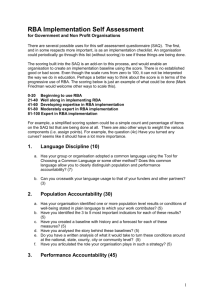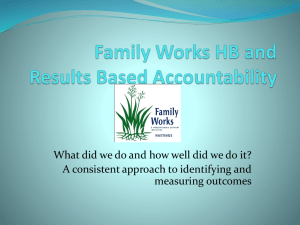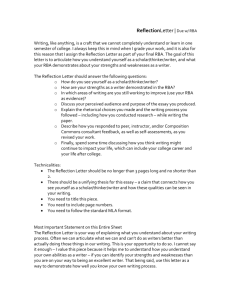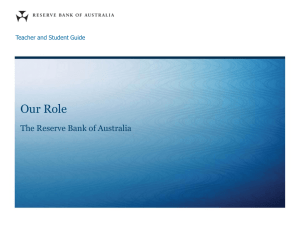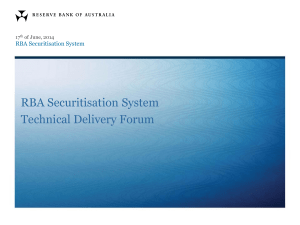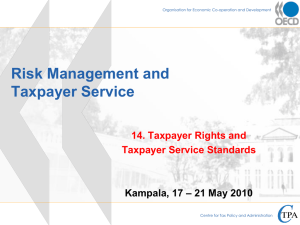Discussion Paper - Improvements to Running Balance Accounts and
advertisement
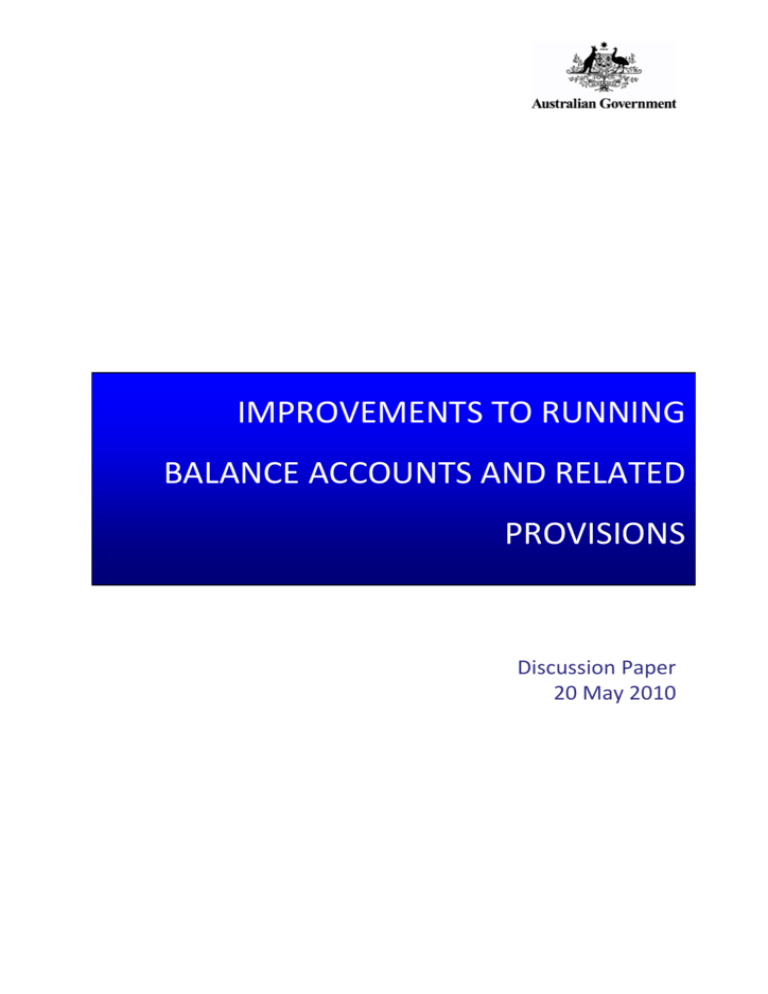
IMPROVEMENTS TO RUNNING BALANCE ACCOUNTS AND RELATED PROVISIONS Discussion Paper 20 May 2010 © Commonwealth of Australia 2010 ISBN 978‐0‐642‐74605‐4 This work is copyright. Apart from any use as permitted under the Copyright Act 1968, no part may be reproduced by any process without prior written permission from the Commonwealth. Requests and inquiries concerning reproduction and rights should be addressed to: Commonwealth Copyright Administration Attorney‐General’s Department 3‐5 National Circuit CANBERRA ACT 2600 Or online at: http://www.ag.gov.au/cca CONSULTATION PROCESS Request for feedback and comments The Government seeks your feedback and comments on the issues outlined in this discussion paper. The information obtained through this process will inform the Government’s approach on the way forward and also assist in meeting the requirements of the Office of Best Practice Regulation. While submissions may be lodged electronically or by post, electronic lodgment is preferred. For accessibility reasons, please email responses in a Word or RTF format. An additional PDF version may also be submitted. All information (including name and address details) contained in submissions will be made available to the public on the Treasury website unless you indicate that you would like all or part of your submission to remain in confidence. Automatically generated confidentiality statements in emails do not suffice for this purpose. Respondents who would like part of their submission to remain in confidence should provide this information marked as such in a separate attachment. Legal requirements, such as those imposed by the Freedom of Information Act 1982, may affect the confidentiality of your submission. Closing date for submissions: Sunday 8 August 2010 Email: RBaccounts@treasury.gov.au Mail: The General Manager Tax System Division The Treasury Langton Crescent PARKES ACT 2600 Enquiries: Enquiries should be directed to John Burge on (02) 6263 3119 Page iii CONTENTS FOREWORD ........................................................................................................................................ V 1. RUNNING BALANCE ACCOUNTS .......................................................................................................... 1 1.1 Proposal ..................................................................................................................................................1 1.2 Comments ...............................................................................................................................................2 2. INTEREST ON OVERPAYMENTS AND EARLY PAYMENTS.............................................................................. 2 2.1 Further simplification: A more integrated approach?............................................................................3 2.2 Comments ...............................................................................................................................................3 Page iv FOREWORD I am pleased to release this discussion paper on streamlining and improving the operation of the running balance account and interest on overpayments provisions in the tax laws. The running balance account provisions play an important role in determining how your tax debts and entitlements are accounted for. The interest on overpayments rules determine when you are entitled to an interest payment for an amount of tax you have overpaid (for example, because you successfully objected to your income tax assessment). On 20 May 2010, I announced that the Government would rewrite the running balance account provisions to provide the flexibility to manage tax debts and entitlements more efficiently and in a way that is more useful for taxpayers. I also announced that the Government would seek your views on how that could best be done and on ideas for improving the way those provisions and the interest on overpayments provisions work, including possibly ways in which they could be integrated into a single system in the longer term. This discussion paper suggests some possible areas to think about but is more broadly seeking ideas that could help simplify, streamline and improve the operation of these provisions. Consultation plays a valuable role in developing changes in the tax law and I Iook forward to receiving your views on this reform. SIGNED Assistant Treasurer Senator Nick Sherry Page v IMPROVEMENTS TO RUNNING BALANCE ACCOUNTS AND RELATED PROVISIONS 1. RUNNING BALANCE ACCOUNTS 1. The running balance account (RBA) rules were enacted in 1999 in Part IIB of the Taxation Administration Act 1953. 2. The rules allow the Commissioner of Taxation to establish RBAs to track taxpayers’ tax liabilities and payments. Initially, it was envisaged that all tax debts and payments would eventually be covered by the RBA system, and that taxpayers would be able to have a single account with the Australian Taxation Office, with tax statements looking something like a credit card statement of account. 3. However, the RBA system has not achieved its original goal, in part owing to limitations in the RBA provisions. For example, the current provisions prevent all tax debts being brought into the RBA system. In particular, debts like the general interest charge and instalment variation penalties have to be accounted for separately. 4. Furthermore, the RBA provisions contain relatively detailed rules prescribing the treatment of payments, credits, surpluses and debts under the RBA system. Despite the broad powers the Commissioner has to manage RBAs 1 , those prescriptive rules have limited the Commissioner’s ability to manage RBAs to produce all the efficiency gains originally hoped for, including the ability to appropriately tailor them to meet taxpayers’ preferences. The current rules have also created uncertainty about the extent of the Commissioner’s authority in some areas, including his ability to amend, adjust or reconstruct accounts. 1.1 PROPOSAL 5. The Government intends to rewrite the RBA provisions to simplify and improve their current operation. At the same time, the rewrite will seek to position the legislation so that, over the medium to longer term, the original RBA vision can be achieved as the Tax Office’s systems are developed further. 6. The rewrite will provide for all debts and entitlements arising in relation to tax laws the Commissioner administers to be accounted for through an RBA. 7. The rewrite will provide a better result for taxpayers and for the revenue by ensuring the Commissioner has a broader discretion about how RBAs are managed. That discretion will have to be exercised so that the accounts provide an accurate reflection of a taxpayer’s debts and entitlements and are consistent both with the intent and effect of the tax laws and with a reasonable accounting approach. The Commissioner’s administration of the RBA system would continue to be subject to the review of the courts (for example, through the operation of the 1 See section 8AAZC of the Taxation Administration Act 1953. Page 1 Administrative Decisions (Judicial Review) Act 1977). The Government is interested in your views about whether there are other matters the Commissioner should have to take into account in managing RBAs. 8. Under the proposed approach, the Commissioner would be able to amalgamate a taxpayer’s tax position into a single running balance account or dissect it into several accounts according to circumstances, which could include a consideration of the taxpayer’s preferences. A taxpayer’s accounts could be changed over time; several accounts could be merged or a single account could be divided. 9. The proposed approach would also clarify the Commissioner’s authority to reconstruct accounts. For example, amounts that were wrongly calculated, or were posted or not posted to a particular account, would be able to be retrospectively allocated to the right account, and in the correct amount. 1.2 COMMENTS 10. The Government is interested in your views on any issues arising from the proposed approach. 11. The Government is also interested in your experiences with the operation of the RBA provisions and your suggestions on how the provisions could be further improved without compromising the simplification objectives of the rewrite. Issues that could be considered further might include: • whether taxpayers should be able to access their RBA information; • whether the Commissioner should have to issue an RBA statement before starting recovery proceedings against a taxpayer; and • whether the possibility of judgment interest being awarded by a court on a debt to which the general interest charge already applies should be legislatively excluded. 2. INTEREST ON OVERPAYMENTS AND EARLY PAYMENTS 12. The Taxation (Interest on Overpayments and Early Payments) Act 1983 provides for taxpayers to receive interest on some overpayments and early payments of their tax liabilities. 13. Under the current legislation, there is no obvious principle governing which cases, and which types of taxes, produce an entitlement to interest and which do not. Instead, it specifies each case where an entitlement arises. As a result, some taxes are not covered. 14. The Government has identified one unintended omission which results in taxpayers not being entitled to interest where they have overpaid franking deficit tax as a result of an amended franking deficit tax assessment. The Government will amend the law to correct that omission. However, the Government is also interested in views on whether the Act should be amended in a more general way, so that overpayments of all taxes can produce an entitlement to interest. This would ensure the Act would not have to be amended each time a new type of tax was legislated. A further possibility that could be considered is extending the entitlement to Page 2 cover overpayments of administrative penalties. The Government will also consider extending the entitlement to interest on all early payments of taxes and administrative penalties. 2 2.1 FURTHER SIMPLIFICATION: A MORE INTEGRATED APPROACH? 15. The Government is interested in views on the desirability of moving, over the medium to longer term, to an approach which better integrates RBAs and taxpayers’ interest entitlements and obligations. Such an approach could yield considerable simplification of the law in this area and its administration. 16. Under a possible approach, the general interest charge might no longer be worked out as an amount owing on a particular debt unpaid for a period of time. Instead, it could be worked out on a taxpayer’s debit balance in an RBA. If the taxpayer had several running balance accounts, the general interest charge could be worked out on the net debit balance across all the taxpayer’s accounts. Similarly, taxpayers could be entitled to interest on the net surplus of all their RBAs. 17. Moving to such an approach would require a number of issues to be resolved. One is that there is currently no standard period over which interest on overpayments is calculated. Integrating an entitlement to interest with the RBA could only work if there were a standard period. Another issue is that general interest charge is currently worked out on a daily compounding basis but interest on overpayments is worked out on a simple interest basis. If interest is to be worked out on a net debit or net credit balance, there is an argument that the method of working out the interest should be consistent. 18. Interest is currently payable to taxpayers on certain income tax related debts they pay more than 14 days before they are due. People don’t normally get a benefit from voluntarily paying their commercial debts or private debts early, so perhaps taxpayers should not get interest for voluntarily paying their tax debts early. On the other hand, it might be argued that a running balance account is more like an overdraft bank account, where interest is payable if the account is in surplus and charged if it is in debit. Your views are sought on whether interest should continue to be paid on these early payments of tax. If they were to be excluded from an entitlement to interest, how could the RBA system distinguish between a credit caused by an overpayment (on which interest was payable) and a credit caused by an early payment (on which it was not)? 19. Working out the general interest charge and entitlement to interest on overpayments or early payments by reference to the net debit or net credit balance across all of a taxpayer’s RBAs could provide the basis for the Taxation (Interest on Overpayments and Early Payments) Act 1983 to be repealed. However, simplification benefits would need to be weighed against any adverse impacts on taxpayers. 2.2 COMMENTS 20. Your views are sought on any issues arising from these possible changes to the Taxation (Interest on Overpayments and Early Payments) Act 1983, on the directions for medium to longer term reforms in this area, on the methodologies that could be used for offsetting debit 2 However, note that paragraph 18 asks whether interest should continue to be paid for any early payments. Page 3 and credit balances across a taxpayer’s multiple RBAs, and on other ways interest entitlements and obligations could be further improved, streamlined or simplified. ************************************************************** Page 4
